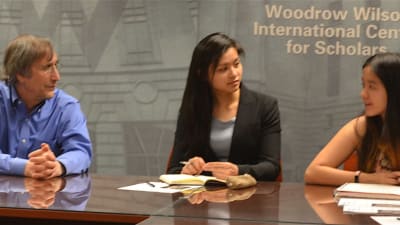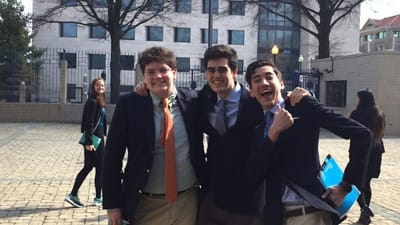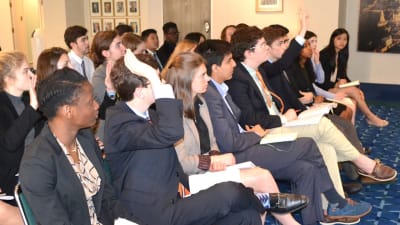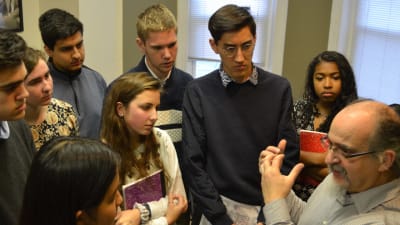Spring 2017 confronts the Israeli-Palestinian Conflict
The Israeli-Palestinian Conflict may be the most notorious dispute in modern history. Not only is it apparently intractable; it also influences countless related contemporary problems. Leaders of the past and present have worked to address it, with limited success. This week our Spring 2017 cohort took its turn, with hopeful results.Our students began on Monday with SEGL’s account of Israeli-Palestinian history: the competing promises of T.E. Lawrence and the Balfour Declaration, the competing boundaries in 1948, 1967, and today, the competing visions for the future within Israel and within the Palestinian leadership. This historical account makes every attempt to be unbiased, but we also told the students that many observers on both sides would want to add, subtract, or edit each PowerPoint slide we shared. Skeptical eyes and ears can be valuable when studying issues like this!
Later than afternoon, we traveled to the Woodrow Wilson Center (a leading DC think-tank) to meet with the noted expert (and advisor to six Secretaries of State) Aaron David Miller. Miller helped provide context for the current status of the conflict and answered questions about his time as a lead negotiator for the U.S. (for example, at the 2000 Camp David II discussions). He is fond of a memorable piece of advice drawn from John F. Kennedy that SEGL students would do well to consider: when asked about his political leanings, Kennedy said “I am an idealist without illusions.” (To read a recent op-ed from Miller on the Conflict, click here.)
On Wednesday morning, we took an early Metro ride up Connecticut Avenue to visit the Israeli Embassy. There the students got an insider’s view of the conflict from Yaron Gamburg, Minister of Public Diplomacy at the Embassy. The students left these visits with a deeper appreciation for the complexity of the situation, the effect of the conflict on the Israeli people and government, as well as a greater understanding of the role of international diplomats in promoting and bridging different points of view.
Longtime Palestinian negotiator Ghaith al-Omari, former Executive Director of the American Task Force on Palestine and current senior fellow at The Washington Institute for Near East Policy, joined us on Friday. (He was the 2015 SEGL Golden Mug Award winner!) Al-Omari was at the table for the Palestinians during the Camp David II negotiations and the Taba talks, served as Director of the International Relations Department in the Office of the Palestinian President, and worked as an advisor to Palestinian leader Mahmoud Abbas. His thoughts, delivered in the organized prose of an Oxford-educated lawyer (as he is), made students think hard. Is it better to curse setbacks in the peace process, or do setbacks only underscore the importance of staying engaged? What is the best way for college students to work on this issue? Is it ever right to respond with emotion, or is it better to ask oneself “Will this advance the cause of peace?” before reacting with anger? (Both al-Omari and Miller are referenced in this recent article about Trump’s Mideast policy.)
The points of view we heard this week are only a few on a vibrant spectrum. These perspectives, however, gave plenty of fodder for student conversation. How important is honoring opposing narratives in resolving conflict? Are negotiations the best strategy going, forward? If not, what is the best strategy? If so, how do we ensure they are successful? These are just a few of the topics our students proposed for reflection.
(We also underlined another SEGL truism: if, after a case study, you want to hear a view different from the ones presented, say something! If there is enough interest, we can often arrange for a supplementary speaker later in the semester; if there is not enough interest, any interested student can set up her or his own meetings during a free period.)












